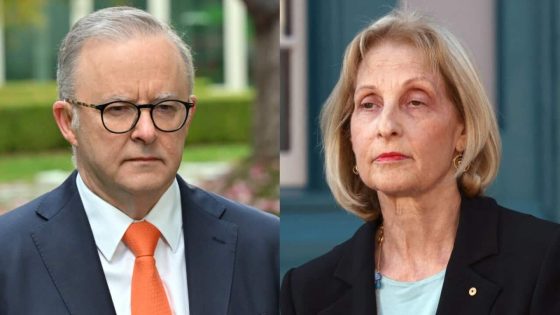Key Points
- Lawyer and businesswoman Jillian Segal has been announced as Australia’s antisemitism envoy.
- The government said it would soon announce an envoy for Islamophobia.
- Prime Minister Anthony Albanese said Jewish people in Australia do not feel safe.
The government has appointed lawyer and businesswoman Jillian Segal as Australia’s first antisemitism envoy.
Segal will advise the government on issues relating to antisemitism and social cohesion, and engage with the community to increase understanding.
Prime Minister Anthony Albanese said the position would be held for three years and said the government would soon announce an envoy to deal with Islamophobia.
Lawyer, businesswoman and former president of the Executive Council of Australian Jewry Jillian Segal will be Australia’s first envoy for antisemitism, for the next three years. Source: AAP / Dean Lewins
Albanese said it was important to combat discrimination “in all its forms” and that Australia has seen a rise in antisemitic attacks since the Hamas-Israel war escalated in October last year.
“I have spoken with members of the Jewish community here (in Sydney), in Melbourne, right around Australia, who had not felt safe,” Albanese told reporters at the Sydney Jewish Museum.
“Members of the Jewish community whose children are worried about wearing their school uniform in our capital cities. That’s not acceptable. Not acceptable, ever.”
“The conflict that is occurring in the Middle East … has caused a great deal of grief for the Jewish community, for members of the Islamic and Palestinian communities,” Albanese said.
He added that Australians “overwhelmingly do not want conflict brought here”.
“What they want here is harmony, and for people to be able to get on with each other.”
Segal said the creation of her role showed the government’s commitment to dealing with the “evil” of antisemitism.
“Antisemitism erodes all that is good and healthy in a society. As such, it poses a threat not just to the Jewish community, but to our entire nation.
“It has the capacity to lie dormant through good times and then, in times of crisis like pandemic, which we’ve experienced, economic downturn, war — it awakens, it triggers the very worst instincts in an individual.”
Segal is a former president of the Executive Council of Australian Jewry (ECAJ), a peak body representing Jewish organisations in Australia.
Acting Opposition leader Sussan Ley said the Coalition welcomed the move to appoint the envoy.
“This appointment is acceptance by the Albanese government that antisemitism is a real and present threat in communities across Australia,” she said in a statement.
“The coalition welcomes any measure by the Albanese government to bring attention to, and combat the rising tide, of antisemitism across Australia.”
ECAJ president Daniel Aghion expressed support for Segal’s appointment, saying she “will bring deep knowledge of the issues and immense energy to the role”.
“We are confident that she will carry out her duties with integrity and distinction. We wish her every success in undertaking this vital work for the betterment of Australian society.”
However, not all Jewish groups welcomed the appointment.
In a statement, the Jewish Council of Australia (JCA) said it was concerned about the appointment of a “pro-Israel advocate” to the position, saying that, given Segal’s track record, it was concerned she wouldn’t sufficiently distinguish between Jewishness and support for Israel.
The JCA was formed in February 2024 in response to “concern that many Jewish representative organisations in Australia fail to recognise that the Jewish community has diverse views on Israel’s military actions and conflate criticism of Israel, and support for Palestinian human rights, with antisemitism”.
The Australian Palestine Advocacy Network said it was dismayed by the appointment and concerned it would undermine anti-racism work.
“It also risks further entrenching the concerning pattern of antisemitism being conflated with criticism of the state of Israel or with support for Palestine, and fuelling tensions rather than fostering productive dialogue in community,” the organisation said in a statement.
What is antisemitism?
In its most basic form, the term antisemitism refers to prejudice or discrimination against Jewish people.
The International Holocaust Remembrance Alliance (IHRA) defines antisemitism as: “a certain perception of Jews, which may be expressed as hatred toward Jews. Rhetorical and physical manifestations of antisemitism are directed toward Jewish or non-Jewish individuals and/or their property, toward Jewish community institutions and religious facilities.”
On Tuesday, Attorney-General Mark Dreyfus said criticism of Israel is “not always” antisemitic but that it “can be”.
“As a matter of principle, when people criticise Israel in a way that they would not dream of applying to another country, then you are at the point of antisemitism,” he said while speaking at the National Press Club.
Dreyfus’ argument is similar to one of the more controversial elements of the IHRA definition of antisemitism: “applying double standards by requiring of [Israel] a behaviour not expected or demanded of any other democratic nation”.
In April last year, more than 100 Israeli and international civil society groups requested that the UN reject that definition, saying that it “opens the door to labelling as antisemitic anyone who focuses on Israeli abuses as long as worse abuses are deemed to be occurring elsewhere”.




